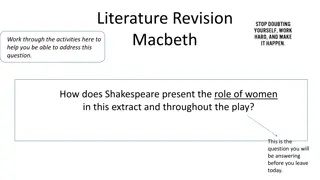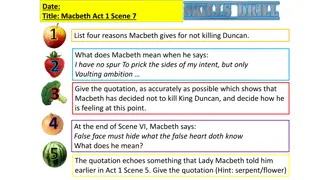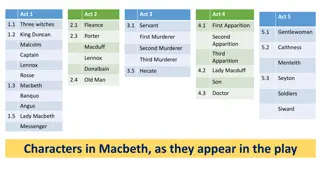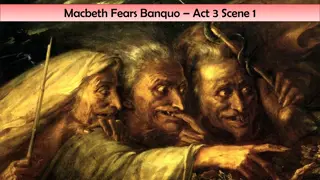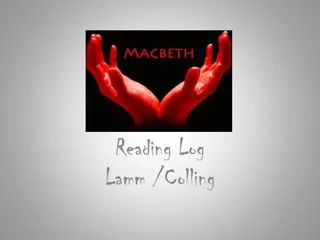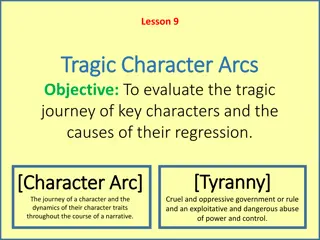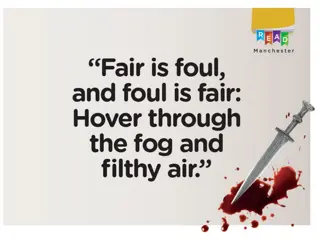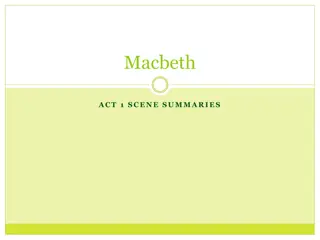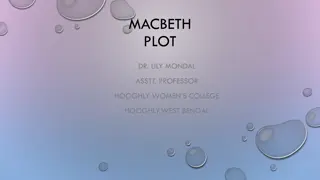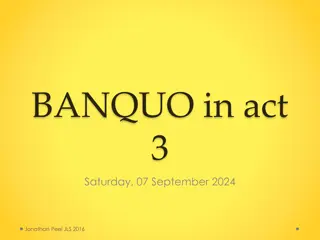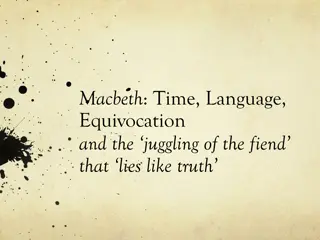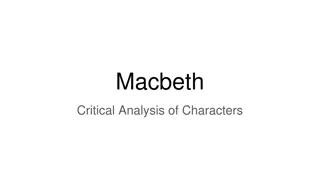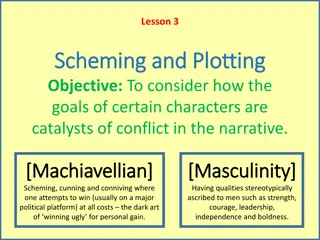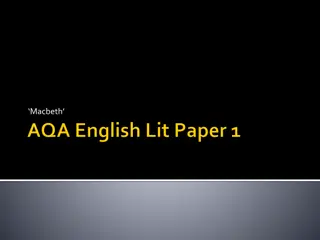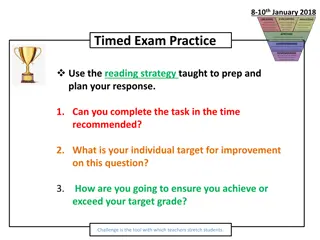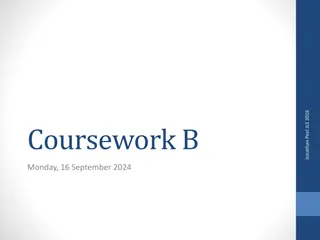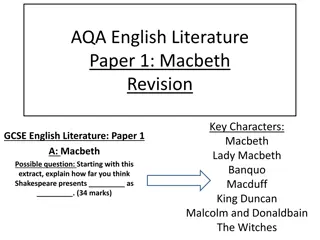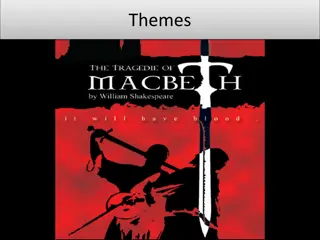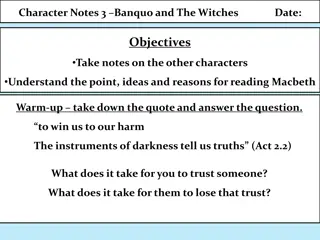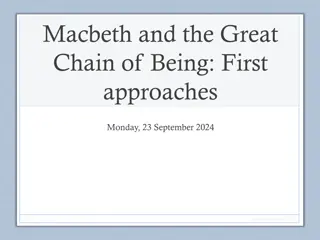Analyzing Paranoia and Its Psychological Effects in Macbeth
Explore the theme of paranoia in Shakespeare's Macbeth, focusing on key characters' psychological traits and the consequences of their actions on the mind. Delve into Macbeth's increasing paranoia, suspicion, and the impact on his relationship with Lady Macbeth. Analyze how delusions of persecution and unwarranted jealousy shape the characters' behaviors and decisions.
Download Presentation

Please find below an Image/Link to download the presentation.
The content on the website is provided AS IS for your information and personal use only. It may not be sold, licensed, or shared on other websites without obtaining consent from the author.If you encounter any issues during the download, it is possible that the publisher has removed the file from their server.
You are allowed to download the files provided on this website for personal or commercial use, subject to the condition that they are used lawfully. All files are the property of their respective owners.
The content on the website is provided AS IS for your information and personal use only. It may not be sold, licensed, or shared on other websites without obtaining consent from the author.
E N D
Presentation Transcript
Lesson 6 Paranoia Paranoia To analyse the psychological traits of key psychological traits of key characters characters and the consequences and the consequences of of actions on the mind. actions on the mind. Objective: To analyse the [Paranoia] [Paranoia] A mental condition characterized by delusions of persecution, unwarranted jealousy, or exaggerated self-importance, typically worked into an organized system. [Suspicion] [Suspicion] Cautious distrust based on questionable evidence.
TEACHERS GUIDE Lesson Structure 6 Paranoia Objective To analyse the psychological traits of key characters and the consequences of actions on the mind. Starter Myth vs. Reality Quiz Reading Act 3 Scene 2 Macbeth paranoia increases and hides his plot to murder Banquo from Lady Macbeth. Scene Analysis PPTs Act 3 Scene 2 Film Clip (on estream Macbeth Fassbender version) 47:30 - Hail Macbeth. 49:00 - Macbeth s suspicion of Banquo. 56:00-58:00 - Murder of Banquo. Main (optional could be set as Homework tasks). PEEL Paragraph How does Macbeth convey a sense of paranoia when discussing Banquo to Lady Macbeth? Plenary What If what if Macbeth had not murdered King Duncan what would the story be like? Key terms Paranoia, suspicion.
STARTER MYTH vs REALITY QUIZ Resource Resource To Be To Be Confimed Confimed
CLASS READING Act 3 Scene 2 Act 3 Scene 2 Macbeth s Suspicion of Banquo Macbeth s Suspicion of Banquo
PEEL TASK How does Macbeth convey a sense of paranoia How does Macbeth convey a sense of paranoia when discussing Banquo to Lady Macbeth? when discussing Banquo to Lady Macbeth?
Act 3 Scene 2 Analysis Act 3 Scene 2 Analysis Brief scene between Macbeth and Lady Macbeth shows the state of their relationship the role reversal where it is now LM beginning to feel the strain of their deed noughts had all spent . Shakespeare s technique the soliloquies and worries begin to echo each other. Macbeth is concerned in the previous scene that even though he has killed Duncan, he is not safely thus. - Macbeth begins to worry that they ve done it all for nothing LM s worries echo his. - both trying to hide their worry and misery from each other Macbeth refuses to let LM in on new plan (to kill Banquo) be innocent of the knowledge, dearest chuck . To try to protect her whilst rebuking him for being miserable what s done is done both suffering from insomnia and nightmares torture of the mind both experiencing the same thing. Macbeth and Lady Macbeth begin to drift apart. Secrecy - After refusing to let LM in on his plan to kill Banquo, their relationship never really recovers he has locked out her partner-in- crime and she becomes dependent on him except when he wishes to deal with his scorpions of the mind the Lady Macbeth of Act 2 is gone. Haunted - LM how evil deeds can ruin a person she is possessed by demons.
Macbeth Lady Macbeth King Duncan Banquo Macduff Macbeth is a Scottish general and the Thane of Glamis who is greeted by prophecies from three witches that he will be made Thane of Cawdor. This comes true. He longs to become King and is then tempted into murder (partly by Lady Macbeth) to fulfill his ambitions to the throne. Once he commits his first crime (killing King Duncan), he is crowned King of Scotland. He is brave but not virtuous. Macbeth is courageous on the battlefield but ill-suited to politics, quickly becoming a tyrant. He becomes suspicious of even his close friends like Banquo. His response to every problem is violence and murder. Macbeth is never comfortable in his role as a criminal and this leads to a psychological regression. Macbeth s wife, a deeply ambitious woman who lusts for power and position. Early in the play she seems to be the stronger and more ruthless of the two, as she urges her husband to kill Duncan and seize the crown. After the bloodshed begins, Lady Macbeth falls victim to guilt and madness to an even greater degree than her husband. Her conscience affects her to such an extent that she eventually commits suicide. Interestingly, she and Macbeth are presented as being deeply in love, and many of Lady Macbeth s speeches imply that her influence over her husband is primarily sexual. Their joint alienation from the world, occasioned by their partnership in crime, seems to strengthen the attachment that they feel to each another. A Scottish nobleman hostile to Macbeth s kingship from the start. He eventually becomes a leader of the crusade to unseat Macbeth. The crusade s mission is to place the rightful king, Malcolm, on the throne, but Macduff also desires vengeance for Macbeth s murder of Macduff s wife and young son. The good King of Scotland whom Macbeth, in his ambition for the crown, murders. Duncan is the model of a virtuous, benevolent, and farsighted ruler. His death symbolizes the destruction of an order in Scotland that can be restored only when Duncan s line, in the person of Malcolm, once more occupies the throne. The brave, noble general whose children, according to the witches prophecy, will inherit the Scottish throne. Like Macbeth, Banquo thinks ambitious thoughts, but he does not translate those thoughts into action. In a sense, Banquo s character stands as a rebuke to Macbeth, since he represents the path Macbeth chose not to take: a path in which ambition need not lead to betrayal and murder. Appropriately, then, it is Banquo s ghost and not Duncan s that haunts Macbeth. In addition to embodying Macbeth s guilt for killing Banquo, the ghost also reminds Macbeth that he did not emulate Banquo s reaction to the witches prophecy. KEY CHARACTERS IN MACBETH Malcolm - The son of Duncan, whose restoration to the throne signals Scotland s return to order following Macbeth s reign of terror. Malcolm becomes a serious challenge to Macbeth with Macduff s aid (and the support of England). Prior to this, he appears weak and uncertain of his own power, as when he and Donalbain flee Scotland after their father s murder. Hecate - The goddess of witchcraft who works to enact her mischief on Macbeth (one of the three witches). Fleance - Banquo s son, who survives Macbeth s attempt to murder him. At the end of the play, Fleance s whereabouts are unknown. Presumably, he may come to rule Scotland, fulfilling the witches prophecy that Banquo s sons will sit on the Scottish throne. Macdonwald Traitor to the King whose army is defeated in battle by Macbeth and executed by King Duncan. Lennox - A Scottish nobleman. Ross - A Scottish nobleman. The Murderers - A group conscripted by Macbeth to murder Banquo, Fleance, Macduff s family (fails). Porter - The drunken doorman of Macbeth s castle. The Three Witches Three black and midnight hags who plot mischief against Macbeth using charms, spells, and prophecies. Their predictions prompt him to murder Duncan, to order the deaths of Banquo and his son, and to blindly believe in his own immortality. The play leaves the witches true identity unclear aside from the fact that they are servants of Hecate, we know little about their place in the cosmos. In some ways they resemble the mythological Fates, who impersonally weave the threads of human destiny. They clearly take a perverse delight in using their knowledge of the future to toy with and destroy human beings.
Key Terms Glossary Key Terms Glossary Language Structure/Narrative Context/concept Analogy - comparison between one thing and another, typically for the purpose of explanation or clarification. Catalyst an element which enters a narrative which causes a reaction usually an increase in conflict and tension. Ambition - desire and determination to achieve success. Emotive language - describes words and phrases meant to evoke an emotional response to a subject. Dramatic irony when the audience is aware of information that the character is not aware of. Hierarchy system where citizens are ranked according to relative status or authority. Iambic Pentameter - a line of verse ten syllables in length each consisting of one short (or unstressed) syllable followed by one long (or stressed) syllable. Enigma mystery and ambiguity developed for dramatic effect withholding of information for the purposes of the narrative. Historical context - refers to the moods, attitudes, and conditions that existed during a certain time. Imperatives command words (usually verbs). Foreshadowing - a warning and indication of a future event. Hubris excessive pride which inevitably leads to one s downfall. Oxymoron - a figure of speech in which apparently contradictory terms appear in conjunction example: fair is foul and foul is fair Irony - the expression of one's meaning by using language that normally signifies the opposite, typically for humorous or emphatic effect. Loyalty - giving or showing firm and constant support or allegiance. Personification human characteristics given to a nun-human form. Motif a repletion of a certain idea or symbol in a narrative Machiavellian - cunning, scheming, and unscrupulous, especially in politics Pun - a joke exploiting the different possible meanings of a word or the fact that there are words which sound alike but have different meanings. Semantic Field - a lexical set of semantically related items, or simply, words and phrases with a similar meaning or context to the subject. Patriarchy - a system of society or government in which men hold the power and women are largely excluded from it. Rhetorical question - a question asked in order to create a dramatic effect or to make a point rather than to get an answer. Suspense - a state or feeling of excited or anxious uncertainty about what may happen Regicide - the deliberate killing of a monarch Soliloquy - an act of speaking one's thoughts aloud when by oneself especially by a character in a play. Tyranny - cruel and oppressive government or rule.
PLENARY PLENARY What if Macbeth had not murdered King Duncan what would the story be like?



